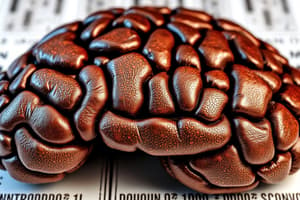Podcast
Questions and Answers
What is the primary function of concepts in cognitive psychology?
What is the primary function of concepts in cognitive psychology?
- To facilitate procedural skills
- To enhance memory recall techniques
- To improve emotional conditioning
- To represent mental categories and organize knowledge (correct)
Which approach focuses on specific examples to define a category?
Which approach focuses on specific examples to define a category?
- Prototype approach
- Exemplar approach (correct)
- Knowledge-based approach
- Schema approach
In semantic memory, what does general knowledge encompass?
In semantic memory, what does general knowledge encompass?
- Culturally valued knowledge shared through various media (correct)
- Detailed scientific knowledge in specialized fields
- Procedural knowledge for completing tasks
- Specific episodic memories of personal experiences
What term describes an abstract idealized representation of a category member in the prototype model?
What term describes an abstract idealized representation of a category member in the prototype model?
Which of the following is an example of explicit memory?
Which of the following is an example of explicit memory?
What is the significance of characteristic features in the prototype approach?
What is the significance of characteristic features in the prototype approach?
How do concepts aid in communication?
How do concepts aid in communication?
Which of the following is an example of high typicality according to Rosch's ratings?
Which of the following is an example of high typicality according to Rosch's ratings?
What problem does Wittgenstein identify in defining certain concepts like 'games'?
What problem does Wittgenstein identify in defining certain concepts like 'games'?
What is the role of schemas in the organization of concepts?
What is the role of schemas in the organization of concepts?
Which type of memory includes knowledge of facts such as 'Paris is the capital of France'?
Which type of memory includes knowledge of facts such as 'Paris is the capital of France'?
How does the prototype approach address the issue of membership in categories?
How does the prototype approach address the issue of membership in categories?
What is a common misconception about concepts?
What is a common misconception about concepts?
Which is a common verification pattern concerning prototypical objects?
Which is a common verification pattern concerning prototypical objects?
What is a common misconception regarding the sharing of features in the prototype model?
What is a common misconception regarding the sharing of features in the prototype model?
Which feature is not typically associated with the prototype of 'birds'?
Which feature is not typically associated with the prototype of 'birds'?
What did most participants in the Brewer and Treyens study recall from the office?
What did most participants in the Brewer and Treyens study recall from the office?
Which of the following best describes stereotypes?
Which of the following best describes stereotypes?
What issue can arise from using explicit measures for studying stereotypes?
What issue can arise from using explicit measures for studying stereotypes?
In Kreiner et al.'s study, participants fixated longer on which pronoun during the reading task?
In Kreiner et al.'s study, participants fixated longer on which pronoun during the reading task?
What did Garcia-Marques et al.'s research suggest about stereotypes over time?
What did Garcia-Marques et al.'s research suggest about stereotypes over time?
What is a potential benefit of using schemas and scripts?
What is a potential benefit of using schemas and scripts?
What aspect of stereotypes is often considered less stable than previously thought?
What aspect of stereotypes is often considered less stable than previously thought?
Which statement regarding concepts, schemas, and scripts is accurate?
Which statement regarding concepts, schemas, and scripts is accurate?
How does the knowledge-based approach influence category membership?
How does the knowledge-based approach influence category membership?
What does the situated nature of concepts suggest about how we represent concepts?
What does the situated nature of concepts suggest about how we represent concepts?
What phenomenon occurs when participants are presented with action-related words?
What phenomenon occurs when participants are presented with action-related words?
What aspect of concepts challenges the notion of their static representation?
What aspect of concepts challenges the notion of their static representation?
Which of the following describes the hierarchy of concepts identified by Rosch and colleagues?
Which of the following describes the hierarchy of concepts identified by Rosch and colleagues?
What role do causal relationships play in concept categorization?
What role do causal relationships play in concept categorization?
What does the embodiment of concepts illustrate about human cognition?
What does the embodiment of concepts illustrate about human cognition?
What is NOT a characteristic of the theoretical models of concepts mentioned?
What is NOT a characteristic of the theoretical models of concepts mentioned?
What term describes the phenomenon where members of a category share attributes and features?
What term describes the phenomenon where members of a category share attributes and features?
According to the exemplar approach, how do people make category judgments?
According to the exemplar approach, how do people make category judgments?
Which of the following is considered a prototypical feature of friendship intimacy?
Which of the following is considered a prototypical feature of friendship intimacy?
What characteristic best describes goal-derived categories?
What characteristic best describes goal-derived categories?
Which of the following statements is true regarding typicality and family resemblance scores?
Which of the following statements is true regarding typicality and family resemblance scores?
Which of the following categories shows little evidence of family resemblance?
Which of the following categories shows little evidence of family resemblance?
How do prototypes and exemplars differ in categorization?
How do prototypes and exemplars differ in categorization?
What features are less prototypical of friendship intimacy?
What features are less prototypical of friendship intimacy?
Which level of categorization includes terms such as 'chairs', 'dogs', and 'screwdrivers'?
Which level of categorization includes terms such as 'chairs', 'dogs', and 'screwdrivers'?
What does the spreading activation model explain about semantic memory?
What does the spreading activation model explain about semantic memory?
Which type of schema focuses specifically on the knowledge we have about ourselves?
Which type of schema focuses specifically on the knowledge we have about ourselves?
What term is used to describe a well-structured sequence of events associated with a particular activity?
What term is used to describe a well-structured sequence of events associated with a particular activity?
How do schemas influence our memory of an event?
How do schemas influence our memory of an event?
What are social schemas primarily concerned with?
What are social schemas primarily concerned with?
What is a potential negative outcome of using schemas and scripts in our memory processing?
What is a potential negative outcome of using schemas and scripts in our memory processing?
Which of these is not a type of schema mentioned?
Which of these is not a type of schema mentioned?
Flashcards
Concept
Concept
A mental representation of a category of objects, typically derived from experience.
Category
Category
A set of objects that belong together, based on shared features or characteristics.
Prototype Approach
Prototype Approach
A theory of concepts suggesting that we represent concepts based on the most typical or average member of a category - the 'prototype'.
Exemplar Approach
Exemplar Approach
Signup and view all the flashcards
Knowledge-Based Approach
Knowledge-Based Approach
Signup and view all the flashcards
Using Concepts
Using Concepts
Signup and view all the flashcards
Organisation Of Concepts
Organisation Of Concepts
Signup and view all the flashcards
Schema
Schema
Signup and view all the flashcards
Prototype
Prototype
Signup and view all the flashcards
Typicality
Typicality
Signup and view all the flashcards
Gradual Category Membership
Gradual Category Membership
Signup and view all the flashcards
Typicality Effect
Typicality Effect
Signup and view all the flashcards
Prototype Model
Prototype Model
Signup and view all the flashcards
Characteristic Features
Characteristic Features
Signup and view all the flashcards
Fuzzy Boundaries
Fuzzy Boundaries
Signup and view all the flashcards
Family Resemblance
Family Resemblance
Signup and view all the flashcards
Goal-Derived Category
Goal-Derived Category
Signup and view all the flashcards
Abstract Concept
Abstract Concept
Signup and view all the flashcards
Concept Prototype (Abstract Concepts)
Concept Prototype (Abstract Concepts)
Signup and view all the flashcards
Prototypical Features
Prototypical Features
Signup and view all the flashcards
Less Prototypical Features
Less Prototypical Features
Signup and view all the flashcards
Relationships in Concept Understanding
Relationships in Concept Understanding
Signup and view all the flashcards
Causal Relationships and Category Membership
Causal Relationships and Category Membership
Signup and view all the flashcards
Concepts as Stable Representations
Concepts as Stable Representations
Signup and view all the flashcards
Situated Nature of Concepts
Situated Nature of Concepts
Signup and view all the flashcards
Connection between Concepts, Perception, and Action
Connection between Concepts, Perception, and Action
Signup and view all the flashcards
Embodiment of Concepts
Embodiment of Concepts
Signup and view all the flashcards
Hierarchy of Concepts
Hierarchy of Concepts
Signup and view all the flashcards
Basic Level of Concepts
Basic Level of Concepts
Signup and view all the flashcards
Stereotypes
Stereotypes
Signup and view all the flashcards
Stereotype Influence
Stereotype Influence
Signup and view all the flashcards
Implicit Association Test (IAT)
Implicit Association Test (IAT)
Signup and view all the flashcards
Gender Schema
Gender Schema
Signup and view all the flashcards
Eye-Tracking & Stereotype Bias
Eye-Tracking & Stereotype Bias
Signup and view all the flashcards
Stereotype Stability
Stereotype Stability
Signup and view all the flashcards
Schemas & Scripts
Schemas & Scripts
Signup and view all the flashcards
Cognitive Overload & Errors
Cognitive Overload & Errors
Signup and view all the flashcards
Script
Script
Signup and view all the flashcards
Person Schema
Person Schema
Signup and view all the flashcards
Self-Schema
Self-Schema
Signup and view all the flashcards
Spreading Activation Model
Spreading Activation Model
Signup and view all the flashcards
Schemas and Memory
Schemas and Memory
Signup and view all the flashcards
Study Notes
Cognitive Psychology - Concepts and Semantic Memory
- Concepts: Mental representations of categories of objects, derived from experience. They are efficient for representing knowledge and help focus on similarities among objects. Concepts enable predictions and communication, though with individual differences in category understanding.
Long-Term Memory
-
Long-term memory: Long-term storage of information. It is categorized into explicit and implicit.
-
Explicit (declarative): Information we consciously recall
-
Episodic: Biographical events (e.g., remembering a specific event or experience).
-
Semantic: General knowledge of words, ideas, concepts (e.g., knowing an elephant lives in Africa).
-
Implicit (non-declarative): Information we're not consciously aware of
-
Procedural: Skills (e.g., riding a bike).
-
Emotional conditioning: Learning to associate a stimulus with an emotional response (e.g., phobias).
-
Priming: Exposure to one stimulus influences response to a subsequent, related stimulus.
-
Conditioned reflex: A learned automatic response (e.g., salivating at the smell of food).
General Knowledge
- General knowledge: Knowledge communicated by non-specialist media. It covers a wide range of subjects and is a component of crystallized intelligence, strongly associated with general intelligence and openness to experience. It is stored in semantic memory. Essential for comprehending the world and learning new information.
Semantic Memory
-
Semantic memory: Our general knowledge of facts, ideas, and concepts, like the knowledge that Paris is the capital of France or the structure of a bicycle. It contains a large number of words and information.
-
Concepts: Categories of items, helping us to organise information and process it more quickly and effectively. We often use the idea of "concepts" and "categories" to organise information. This is also a way to retrieve, store, and process information more effectively.
Defining Concepts
- Concepts: We define categories by grouping objects that share a common feature(s). For any concept, there is a question that defines each concept that is an answer. For example, if asked 'what is a dog', the answer to that question illustrates your concept of dog.
Prototypes
- Prototype approach: Represents the category member as an abstract, idealised representation of the category with the average representation of a category member. It is built on common elements within a group/category, not necessarily identical features. Members don't have equal standing as some are strongly typical for a category while others are not. Prototype members are rapidly verified.
Exemplars
- Exemplar approach: Relies on instances (exemplars) of concepts, not a prototype. Instances are stored in memory and when we encounter new items, we compare them with saved exemplars.
Knowledge-Based Approach
- Knowledge-based approach: We have knowledge of the relationship between concept attributes, in addition to features/attributes. For example, sharp is linked to dangerous. Knowledge also influences our categorization decisions, especially with causal relationships. This is important in categories with blurred boundaries.
Situated Nature of Concepts
- Situated nature of concepts: Concepts vary across situations, depending on our present goals and situational aspects. The use of concepts involves sensory-motor/perception and behavioural systems, in addition to abstract representations.
Schemas
- Schema: A mental structure used to organize knowledge in a meaningful way, particularly about the world around us, other people, and ourselves. Schemas can be about specific types of situations. These types of knowledge units are larger than single concepts.
- Types of Schemas: Social schemas (general knowledge about social relationships), person schemas (information about specific individuals), self-schemas (info about ourselves), role schemas (appropriate behaviours in defined situations), event schemas (sequences of events, also known as scripts).
Scripts
- Scripts: Well-structured sequences of events associated with a particular activity. They assist us in comprehending daily occurrences. They give us a framework from which we expect certain things to happen.
Stereotypes
- Stereotypes: Simplified generalizations of groups. They can influence our behaviour and understandings of the world around us. Stereotyping is a specific type of schemas. Some research suggests they are less fixed and stable than previous thought. Stereotypes can enable quick judgment, which can be necessary, but errors can also result from this.
Studying That Suits You
Use AI to generate personalized quizzes and flashcards to suit your learning preferences.




